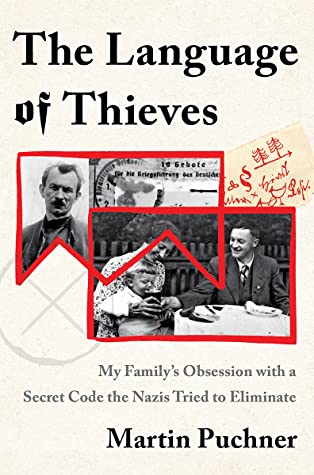
The Language of Thieves
My Family's Obsession with a Secret Code the Nazis Tried to Eliminate
کتاب های مرتبط
- اطلاعات
- نقد و بررسی
- دیدگاه کاربران
نقد و بررسی

Starred review from July 27, 2020
Puchner (The Written World), a professor of English and Comparative Literature at Harvard, brilliantly integrates the personal and the professional in this intriguing account of his quest to learn as much as possible about Rotwelsch, a mash-up of German, Yiddish, and Hebrew spoken by itinerant people in Europe since the Middle Ages. Puchner’s interest in the subject goes back to his childhood in Nuremberg, Germany, in the 1970s, where his uncle Günter was an authority on Rotwelsch and the Puchner family adopted it as a secret code. Following Gunter’s death, the family stopped using Rotwelsch, but the practice influenced Puchner’s decision to study linguistics. In his dogged research into the history of Rotwelsch and his family’s connection to it, Puchner discovered that 16th-century Protestant theologian Martin Luther viewed the language as a link between three groups he despised (Jews, foreigner beggars, and vagrants), and that Puchner’s paternal grandfather, a historian of names, had sought to advise the Nazis on how to distinguish between Jews with German-sounding names and Germans whose names sounded Jewish. Puchner concludes that the persistence of Rotwelsch, despite centuries of determined opposition, is a testament “to the endurance of generations of ultimate outcasts.” Rich with insight and vivid character sketches, this moving and well-informed cultural history deserves a wide readership.

August 15, 2020
An American professor discovers that his grandfather was a Nazi as well as a scholar with an interesting specialty. Born in Nuremberg and now a professor of English at Harvard, Puchner made his discovery 30 years ago while studying at the Widener Library. Recalling that his German grandfather had been an archivist specializing in the history of names, he searched the card catalog for his papers and found a trove, including a 1934 article, "Family Names as Racial Markers," which discussed Jewish names throughout history. Originally based on the Bible, they soon reflected non-Hebrew sources. Arriving in Germany in the Middle Ages, Jews often adopted German names, usually related to a location. Few chose Nuremberg, which forbade their settlement, but Frankfurter became a common Jewish name. A crucial change came after the 18th century, when nations granted Jews equal rights--"the worst mistake in history," according to Puchner's grandfather. En masse, Jews adopted German names, but since German Christians often chose biblical names, it became difficult to tell them apart. The author's grandfather believed that because Jews sought to blend in to further their nefarious plans, the Reich should consult experts like himself to distinguish Jewish-sounding German names from German-sounding Jewish names. As a scholar in love with words and language, Puchner gives these priority, so his attention wanders, but the digressions are never less than intriguing. He cannot resist exploring the secret languages used by vagrants and criminals. From childhood, he was fascinated by Rotwelsch, a popular argot throughout Europe dating from the Middle Ages that contained terms from Hebrew, Yiddish, Latin, and Romani. It was regularly denounced by establishment figures, from Martin Luther to Puchner's grandfather. The author also devotes long sections to Rotwelsch's history, social role, and vocabulary. A compelling mixture of memoir and philology.
COPYRIGHT(2020) Kirkus Reviews, ALL RIGHTS RESERVED.

October 1, 2020
Puchner (English, comparative literature, Harvard Univ.; The Written World) reveals the power of archives and language in preserving the cultural record in this newest work. As a child growing up in Germany, the author heard Rotwelsch, a bewildering hybrid of Hebrew and German often spoken by persons of Jewish descent. Puchner's uncle G�nter amassed a significant personal Rotwelsch archive, perhaps as "atonement for a regime that had tried to eliminate the language and its speakers." Tracing back further, Puchner's grandfather Karl was an archivist and National Socialist Party Member. The Nazi Party was grappling with racial identification as many Jewish families held German names. Puchner explains how Karl believed targeting Rotwelsch speakers was an additional identifying tool for the Nazi Party. What innocently began as family research turned into an uncomfortable confrontation with past secrets. Puchner thoroughly documents Rotwelsch's history and its connections to Hebrew, Yiddish, and German. His expertise and dedication to a language all but eliminated by World War II is impressive, with his family's work almost exclusively documenting this underresearched language. Each chapter ends with drawn zinken, a pictographic component of Rotwelsch, and an assortment of vocabulary. VERDICT A puzzling family mystery uncovers a forgotten language and its ties to Nazi Germany in this probing literary history that will attract linguistics enthusiasts.--Jessica Bushore, Xenia, OH
Copyright 2020 Library Journal, LLC Used with permission.

























دیدگاه کاربران